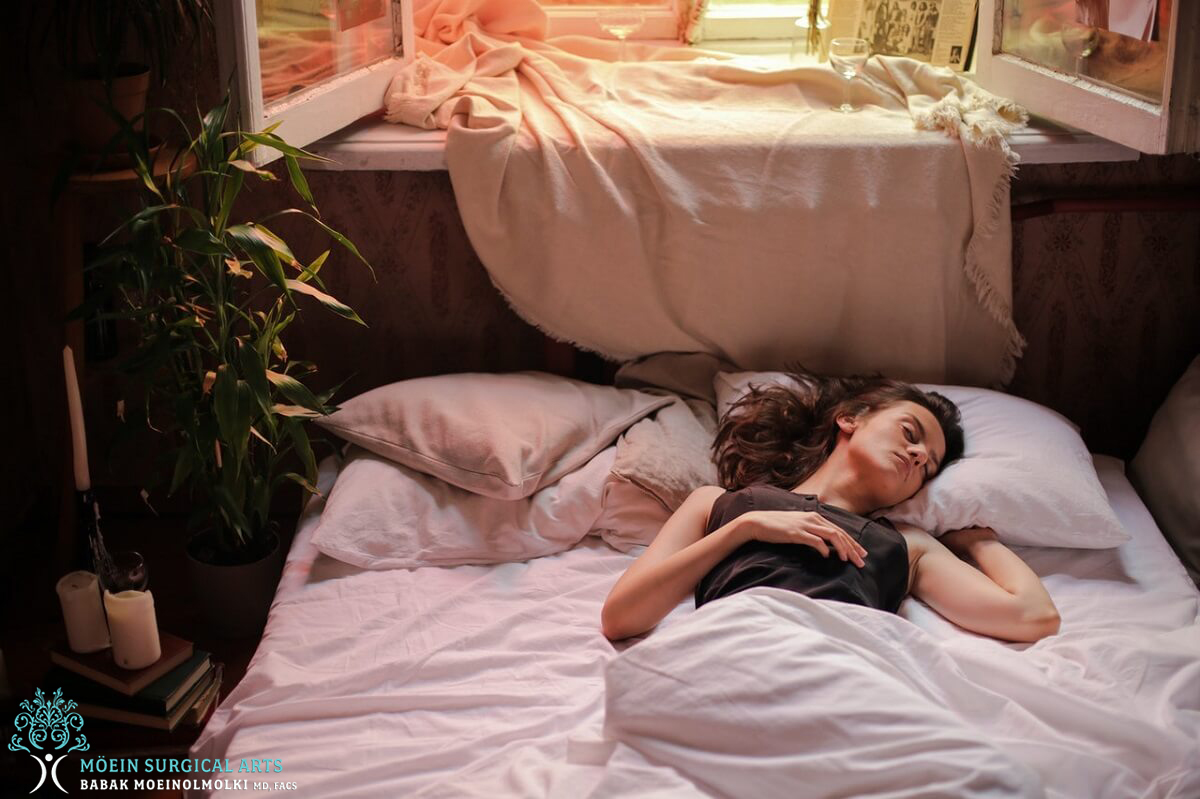
Sleeping well after procedures like the facelift and abdominoplasty (tummy tuck) is the best way to get the most impressive results.
The facelift and tummy tuck happen to be two of the most common cosmetic surgeries performed today. They are both major surgeries that can dramatically alter your appearance.
The facelift can give you tighter, younger skin on and around the face.
Abdominoplasty can give you a narrower midsection and tighter abs.
This advice would also work well with other major cosmetic surgeries like breast augmentation, Brazilian butt lift, and the arm lift/thigh lift. Studies show that getting a good night’s sleep following these procedures helps your body heal more efficiently. That’s just what you want when recovering from cosmetic surgery.
While the facelift and abdominoplasty are unlikely to be performed together, the way you should sleep after surgery works for both aesthetic procedures. Here are some tips that can help you get deeper, more rejuvenating sleep as you return from the cosmetic surgical center and begin to heal at home.

A good night’s rest is important for health reasons, period. Without sleep, you face a whole host of problems, including daytime sleepiness and general illness. Sleep helps to regulate your mood, digest food better, and think more clearly. Your body also operates more efficiently when you get a full amount of sleep each night.
After cosmetic surgery, you need quality sleep to curb inflammation and improve blood flow between your body’s tissues and cells. The deeper you sleep, the faster your incisions and affected tissues will heal, and the quicker you’ll see your cosmetic surgery results.
There is one additional reason sleep is so important. Sleep tends to make the brain more resistant to pain stimuli. That means that quality sleep can more or less function as a low-level pain medication, free of charge, and without a prescription. All you need to do is rest deeply, which can be done by adhering to the following deep sleep habits.
Following aesthetic surgeries like the facelift and abdominoplasty, you can forget about sleeping on your stomach for a while. Likewise, if you are used to sleeping on your side. You’ll have to get used to sleeping on your back, at least until your body has fully healed.
During the initial healing process, do your best to stay on your back with your head elevated. Keep this position throughout the night and until morning. Doing so has three primary benefits.
Less Swelling: Keeping your head and body elevated cuts down on the amount of fluid that accumulates near the incision sites. With less fluid, you’re able to reduce swelling which can improve both comfort and healing times.
Incision Protection: Laying on your back keeps your pillow and sheets from rubbing against the incisions around the face after a facelift and around your abdomen after abdominoplasty. This lets the incision sites heal as you restfully doze.
Maximized Results: Sleeping on your back will help you maintain the aesthetic look your cosmetic surgeon gave you.

The time to start practicing sleeping on your back and upright is around two weeks before your procedure. This helps you adjust to the position naturally. You’ll also be able to tweak your position until you find the techniques that work best for you.
Sleeping in a recliner might be a good idea, at least for a few days following surgery. If you don’t want to go that route, opt for a firm mattress, and lay with a pillow or two under your knees. If you tend to roll in your sleep, place extra pillows around your body to keep from tumbling over in the night. This position should keep you comfortable enough to heal properly after the facelift or abdominoplasty surgery.
While you’re practicing your sleep habits a couple of weeks early, you can go the extra step by cleaning your house, preparing some meals, and tending to any chores that will make your living space comfortable enough for a good night’s rest. You may also want to invest in room darkeners, which can help you achieve a deeper sleep.
Many people find themselves incredibly stressed when they have cosmetic surgery. They’re worried about their results. If you’ve taken the time to find an experienced cosmetic surgeon, chances are low that you will have complications. These issues should be discussed with your surgeon beforehand, but the time immediately following your surgery is definitely not the time to worry. Try your best to relax. Only when your mind and body are completely at ease can you hope to achieve fast and effective healing.
If you notice areas swelling after your cosmetic surgery, use a cold compress to reduce the swollen tissue. Press lightly against your skin with the compress for thirty seconds, then remove. Repeat this cycle for around fifteen minutes. You can do this routine each hour as needed. The cold in the compress helps to reduce inflammation and slow blood flow, which helps to make the swelling less prominent.

During your waking hours, try to get as much activity as possible (as long the activity methods are okayed by your doctor). Getting your body moving by briskly walking, for example, improves your circulation, which aids in healing. You’ll also set yourself up to sleep a little deeper come evening.
To get the most rest, try to reduce your energy drink and caffeine consumption to the absolute minimum. At the most, stop drinking sleep-disrupting beverages by three to five in the evening, depending on your level of sensitivity. These drinks can either keep you awake at night or rob you of the deepest sleep, neither of which are good for proper healing.
In short, getting enough sleep promotes proper healing and is necessary for attaining the most beautiful and long-lasting results after a facelift, abdominoplasty, or any other major cosmetic surgery.
To learn more about cosmetic surgery and what it can do for you, call Moein Surgical Arts in Los Angeles, California to schedule a consultation with Dr. Babak Moein – (310)694-4486.